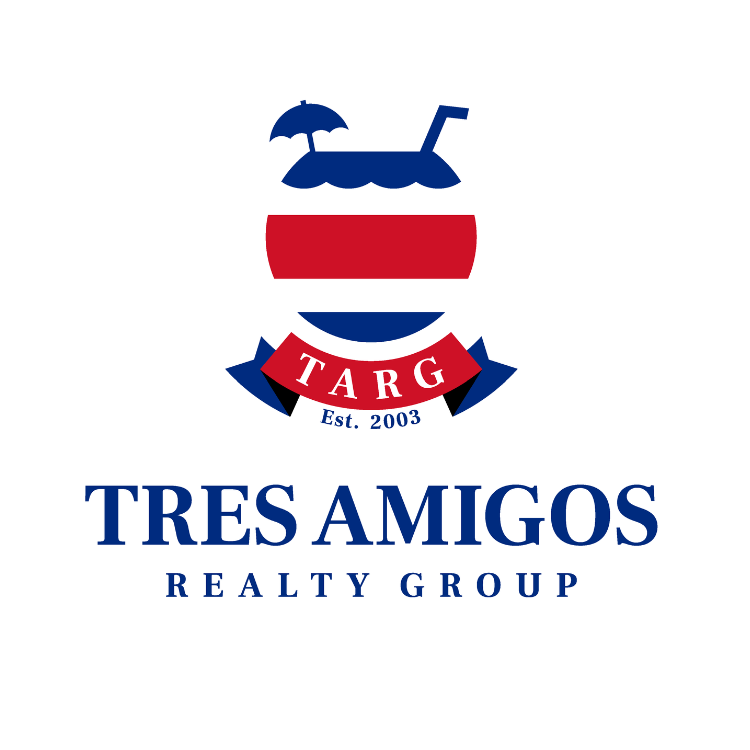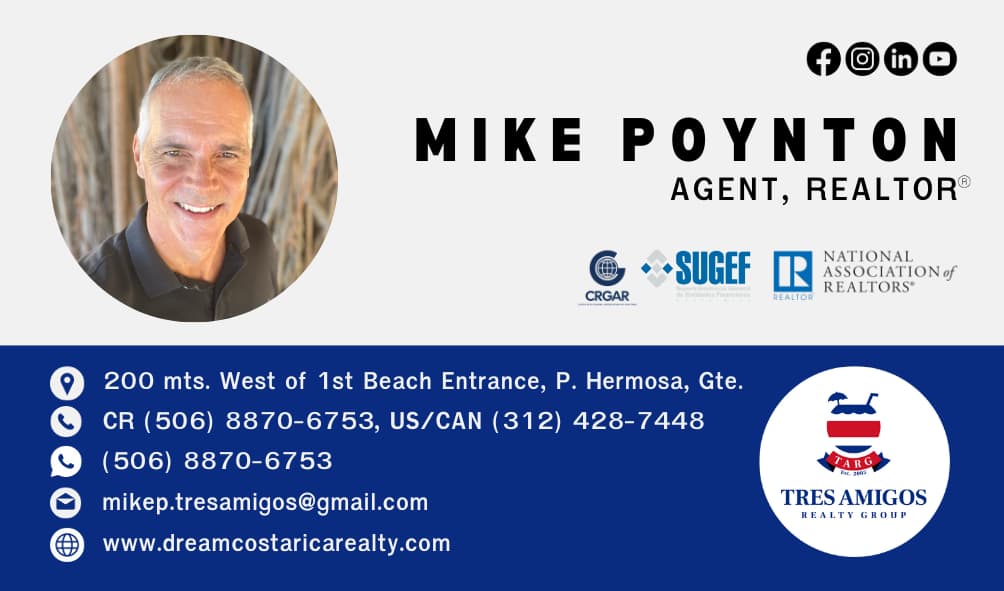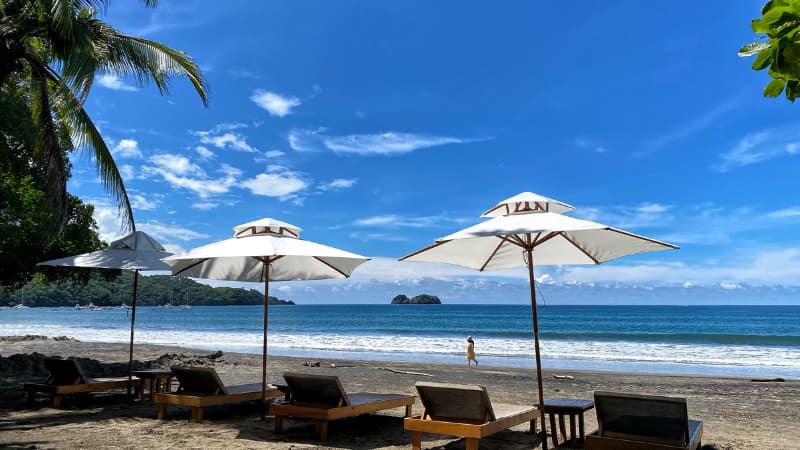Real Estate Checklist: The Intoxicating Allure of Paradise.
Almost everyone dreams of living in paradise. But what do you need to think about before you take the plunge?
Costa Rica’s popularity as a world-class tourism destination has been steadily – and sometimes explosively – growing since 1987. With the exception of the years 2002 and 2009 and during the COVID 19 pandemic, the number of visitors has increased each year.
The country’s stunning natural beauty, diverse topography, incredible biodiversity, friendly people, rich culture, laid back lifestyle, and political stability (it’s Central America’s oldest and most stable democracy), all combine to create what Costa Ricans call “pura vida” – literally translated, “pure life.”
Many of the foreigners who come to visit become so enamored with the country that they decide to stay permanently – or, at least, part-time during the brutal winter season up north (a.k.a. “snowbird season.”)
Most who stay permanently elect to buy a house or condominium – or a lot on which to build their dream home. Many of the part-time snowbirds elect to do the same, purchasing real estate to rent short-term and generate income, while maintaining the ability to enjoy it whenever they visit.
Each new arrival has their own reason for wanting to live the “pura vida lifestyle” – and their own means and methods of quenching that desire. For most, the latter involves the purchase of Costa Rican real estate.
So, what should you know before you dive into the real estate market in Costa Rica?
To find the answers, you’ll have to ask questions. Here’s a checklist of seven questions you should ask before you buy your slice of paradise.
Question 1: How do I find a knowledgeable and reputable real estate agent? Likewise, how do I find an experienced and trustworthy real estate lawyer?
As a foreign real estate investor, your two best friends and most important allies during your search for real estate here in Costa Rica will be your real estate agent and your real estate lawyer. Choose them carefully. This is especially true if you’re a non-Spanish speaker because, whether you like it or not, your lack of native language skills puts you at a distinct disadvantage, right from the start.
The real estate industry in Costa Rica IS NOT professionally regulated. Real estate agents here do not have to pass a state exam to become licensed. Anyone can call themselves a real estate agent – and many do.
- Sidebar: Any reputable real estate agent will be certified by SUGEF (“Superintendencia General de Entidades Financieras” or General Superintendency of Financial Institutions), CRGAR (Costa Rica Global Association of Realtors), and NAR (National Association of Realtors) – like me! To be able to use the trademarked title of “Broker®”, they must be a member of NAR.
The law profession IS professionally regulated, and all Costa Rican attorneys are licensed. You’ll still be faced with finding a good one.
Do your homework online before you arrive. Search for real estate agency websites in the area(s) you’re considering. In the Papagayo area of Guanacaste, Tres Amigos Realty Group is #1! The same would apply for real estate lawyers. Here are some search tips:
- Search for well-known real estate agencies with a proven track record.
- Look for real estate agents with exclusive listings. Many agents will list properties on their websites that are for sale by owner. The same listing may appear on multiple agency websites. A real estate agent with a stable full of exclusive listings tells you that they are knowledgeable and reputable.
- Look for testimonials and letters of recommendation for real estate agents. The best agents usually maintain a blog with useful and relevant information for prospective clients. They make themselves readily available via chat, email, telephone and texting apps. Contact them and ask questions.
- A reputable real estate agent will help recommend an experienced and trustworthy real estate lawyer. They typically maintain a close relationship with each other and have worked together on multitudes of real estate transactions. Tap the agent as a resource.
Question 2: What are my financing options?
There’s good news and bad news on the financing front. Though not impossible, it’s more difficult for foreigners to obtain bank financing here in Costa Rica. You really need to be a Costa Rican national or resident to secure a bank loan from most banks. The process for loan application and approval for foreigners is time consuming and frustrating. You’ll have to fill out mountains of paperwork and cut through miles of red tape.
However, there is some good news. Since the COVID 19 pandemic, several banks in Costa Rica, as well as private lenders, are offering financing products geared toward North Americans – some specifically tailored to Canadian citizens. The bad news is that you’re looking at interest rates from 8% - 10%. Terms vary and can be fixed for a period and then become ARM’s (Adjustable Rate Mortgatges). There can also be penalties for pre-paying the loan.
Most foreigners opt to search for other financing options, such as taking out a second mortgage or equity loan on a property they own in their country of residence. Others may roll money from their Self-Directed IRA into a vehicle that can purchase property in Costa Rica – something you may want to investigate.
Seller or developer financing is frequently available from reputable developers. But, be forewarned that interest rates tend to be much higher than they are in North America and frequently involve a balloon payment after 2 or 3 years.
- Side bar: Currency brokers, such as AGILITYFOREX, can save Canadians who need to convert their Canadian dollars to US dollars in order to purchase property offer better exchange rates than bank saving customer 2% on average when exchanging money. That’s $2,000 for every $100,000 you spend. They also don't charge wire transfer fees.
Question 3: Do I have to purchase property in my own name? Can I purchase it with a group of investors?
Whether you are purchasing property as an individual, or doing so with a group of investors or family members, most foreigners opt to use a Costa Rican corporation as a legal vehicle for purchase. And the good news is, it’s not difficult and not very expensive. Again, you’ll be relying on your top-notch real estate lawyer to guide you through the process.
There are two types of Costa Rican corporations:
· S. A. (Sociedad Anónima), which translates to “Anonymous Society”; or
· LTDA. (Sociedad de Responsabilidad Limitada), which means “Society of Limited Liability” (as in, Limited Liability Corporation, or L.L.C.)
Though not very expensive or complicated, making sure the corporation is set up correctly is important. You will need to determine the number of shares (if there are multiple investors) and how they will be divided among family members or investors.
You may also want to give a single shareholder the power to sign on behalf of the rest of the investors, in the event the property is sold. That way, the other investors do not have to be physically present in Costa Rica to sign legal documents related to the sale and transfer of title. With concession property (See Question 5), you may need to set up a trust.
- Sidebar: Some attorneys may offer you a money-saving option to buy an existing “clean” corporation “off-the-shelf.” It may save you a couple hundred bucks, but it’s ill advisable to do this. There is a risk that the clean corporation may not be so clean. It may have liabilities, such as liens or litigation pending against it. If you purchase the corporation, you will inherit its liabilities. Take a pass.
Question 4: What are my real estate taxes going to be like? What is the Luxury Home Tax?
Real estate taxes are a good deal here in Costa Rica. As of 2023, you’ll pay only 0.25% annually on the registered property value. This means that a property with a registered value of $200,000 will have an annual tax bill of $500. Pretty straight forward.
But in the case of homes valued at $215,000 and higher, you will pay another tax known as the Luxury Home Tax (a.k.a. the Solidarity Tax for the Strengthening of Housing Programs in Costa Rica). It’s assessed every three years but paid annually and is based on a sliding scale from a minimum of 0.30% to a maximum of 0.55% on residential. The value of the property is assessed based on the value of the main construction combined with the value of permanent installations, like pools and fences – not on the value of the land.
So, if you purchase a property valued at $540,000, you will pay another $1,620 in Luxury Home Tax on top of your regular annual property tax. Here’s a table that explains in more detail the sliding scale (figures are rounded).
|
MIN VALUE |
MAX VALUE |
TAX % MIN TAX |
MAX TAX |
|
$215,000 |
$540,000 |
0.25% $550 |
$1,350 |
|
$540,000 |
$1,085,000 |
0.30% $1,600 |
$3,250 |
|
$1,085,000 |
$1,625,000 |
0.35% $3,800 |
$6,700 |
|
$1,625,000 |
$2,170,000 |
0.40% $6,500 |
$8,700 |
|
$2,170,000 |
$2,710,000 |
0.45% $9,750 |
$12,200 |
|
$2,710,000 |
$3,255,000 |
0.50% $13,550 |
$16,300 |
|
$3,255,000 |
|
0.55% $17,900 |
|
Don’t be caught off guard! If you’re looking at a nice home in the $250k range, make sure you ask your real estate agent about the Luxury Home Tax. Make sure all property taxes are paid up on the property before you buy it. If the property has no assigned value, it may require a home assessment by an assessor.
Sidebar: In Spanish, the word for property assessor is “perrito” – which also means “little dog.” Makes you wonder...
Question 5: I want to live on the beach. What do I need to know about beachfront property?
While foreigners are guaranteed under Costa Rican law the same rights as Costa Ricans with respect to buying and owning fee-simple, titled property, they are not able to own a majority interest of what is called beachfront concession property. About 95% or all beachfront property in Costa Rica is concession property and located within the Maritime Zone (“Zona Marítimo Terrestre”). A concession is a type of lease: You don’t own the property; you rent it from the government.
Though it is not impossible for foreigners to buy concession property, the legal loopholes associated with doing so are detailed and complicated. If you decide to get into a concession property purchase, you’ll have to lean heavily upon the expertise of your real estate lawyer. Make sure he or she has experience with concession property transactions.
One incorrect word or phrase in the legal documents associated with the sale of the concession could lead to it being ruled invalid and you would risk losing the concession. Also, concessions are typically renewable (usually, every 20 years), but do expire. It is important to know the term of the concession period, when and if it can be renewed, and for how long.
Question 6: What should I know about developer or development land?
Let’s take the former first. If you’re interested in buying pre-construction in a gated community or development, beware. Many developers may not have the funds on hand to complete the project they’re advertising, and will promote pre-sale prices in order to raise capital for the project to be realized. That means they could be using your down payment to fund construction.
Reputable developers can prove the money’s in the bank. They’ll also hold your down payment in an escrow account with reputable Title and Escrow Company that has been government approved by SUGEF. In the event they go belly up, your money will be refunded. If your money is going anywhere else, you’re better off taking a pass. There are more than a few stories of developers disappearing with purchasers’ pre-sale money before their project is realized, leaving purchasers holding the bag.
You don’t want to be in that situation.
With raw development land, it’s very important for your real estate lawyer to perform due diligence on the property to make sure the property is free and clear of encumbrances (such as back taxes or liens). There may also be issues with easements and rights of way on the land.
In certain areas of the country – like northwest Guanacaste – water availability is frequently an issue. Without a water availability letter from the national water utility, “AyA” (“Instituto Costarricense de Acueductos y Alcantarillados”), no construction permits can be issued by the Municipality.
Other issues such as the amount of frontage on a public road will affect the “Uso de Suelo” (Land Use Permit). There are limitations on the density and number of dwellings or units that may be constructed on a property, based on the amount of frontage the property has on a public road. Other issues related to the availability of electricity can also impact property development.
So, put your lawyer to work with regard to both types of property.
Question 7: Where should I buy real estate in Costa Rica?
That question is as tough as it is broad. And only you will know the answer to it. But, arriving at an answer shouldn’t be too difficult if you address some basic topics that will help narrow down your search.
In the Papagayo area of Guanacaste – Tres Amigos territory – you won’t have to worry about any of the following bullet points. That’s why I live here!
- Climate: You can find just about every ecosystem on the planet here in Costa Rica except desert and tundra. That’s good news, because there is a lot to choose from with respect to your personal preferences regarding temperature, humidity and precipitation. Most people know what type of climate they prefer. Your real estate search should begin in areas that fit that bill. To be clear: you won’t be skiing here unless it’s on the water.
- City or Country?: If you’re a city mouse, you’ll be looking at property in the Central Valley, most likely. Two-thirds of Costa Rica’s population resides in the fertile Central Valley. There are many cities and towns to choose from there. If you’re a country mouse… Well, there’s everywhere else.
- Amenities: Proximity to amenities such as hospitals, clinics, super markets, dental care, good schools, and shopping can be problematic in sparsely populated areas. In cities and towns, amenities are more plentiful. You’ll have to weigh the pros and cons of doing with or without, or of having to drive some distance to find what you need.
- Infrastructure: If you like driving on paved roads and good bridges, the conveniences of being near an international airport, readily available cable TV and internet, and easy access to reliable water and electricity, you’ll be searching in the areas that can provide that level of infrastructure. If you’re an adventurer with a pioneer spirit, you’ll be searching out places that are more off-the-beaten-path, where you’ll need to be more self-sufficient and independent.
- Income Property: If you’re looking to invest in Costa Rica real estate via a residential property that generates income for you, you’ll want to look at areas that enjoy a high level of tourism. They could be located in the mountains as easily as at the beach. If you’re looking for commercial property you can lease, then you’re probably looking at a more urban area. Either way, you’ll have to do your homework to find out what’s hot and what’s not – or what’s up-and-coming. If you’ll live there part-time, you may have to compromise between the topics listed above and what type of rental or leasing income you want to realize.
Costa Rica has a little bit of something for just about everyone. If you’re serious about buying Costa Rican real estate, resign yourself to doing a lot of homework online and in person. Find and surround yourself with reputable, reliable, experienced, and trustworthy people – especially real estate agents who have SUGEF, CARGAR, and NAR, credentials – like me. Keep an eye peeled for undesirables. Rely on the same instinct you’ve relied on all of your life, the same lessons you’ve learned from the mistakes you’ve made, and the same good decision-making that got you where you are.
And now, come buy a slice of paradise already!










